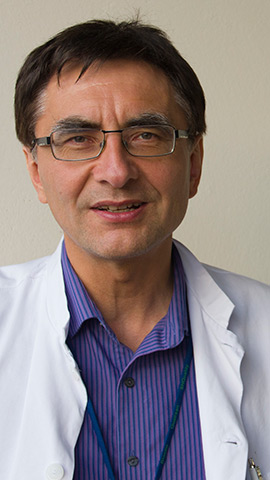Finland Is a Role Model in Cancer Treatments
In the United Kingdom, cancer research receives 46 times more funding than in Finland. Nonetheless, the results of Finnish cancer researchers are quoted far more than our UK colleagues and the cancer mortality rate is also low in Finland. However, the positive trends will not continue if the field is not supported, warns Professor of clinical oncology Heikki Minn.

My mother used to inform me about the bliss of being born in a Nordic Country: it is a jackpot in the lottery of life, as the Secretary General of the UN of that time Dag Hammarskjöld well expressed it.
The dream of the Nordic welfare state has been jeopardised as the various economic and terrorist threats have affected us all. However, thus far, the system based on democratic and comprehensive health care has created good prerequisites for high-quality cancer treatment.
* * *
In Italy, a European cancer register founded in 1988 is maintained. At the moment it provides statistics of cancer mortality rates in 30 European counties. The register measures the 5-year survival of cancer patients. The newest report, published in 2009 (EUROCARE 4), was strongly in favour of the Nordic system. Finland, Sweden and Norway were on top, but Denmark was not as successful positioning at around the same position as for example the United Kingdom.
According to the Finnish Cancer Register the 5-year survival rate of the 14 most common cancers was 66 % during 2003–2006, when during 1998–2001 the same rate was 58 %. Therefore, Finland has maintained and perhaps even improved its already high-quality cancer treatment. However, what must be taken into account is the statistical illusion created by earlier diagnosing and registering of cancers.
* * *
Finland is a role model also in cancer research. In 2012, a thorough analysis of references to scientific publications on clinical and scientific oncological research was published in the Thomson Reuters Web of Science. When counting in the European countries and North-America, Finland was number one with 26,4 references per publication. The corresponding number was 22,4 for the USA; 20.2–21,2 for the other Nordic counties and Holland; 17,5 for England; 17,3 for Japan and 16,8 for Germany.
Most of the high-quality research in Finland is made in laboratories, but Finland has also gained international fame in clinical oncological research by, for example, being the first to demonstrate the effect of the orally administrated medicine, imatinib, in the treatment of the rare GIST-tumour of the gastrointestinal tract and the effects of short-term tratsumabi-infusions given during nine weeks in the adjuvant therapy of HER-positive breast cancer.
* * *
Finnish university hospitals and some central hospitals have been actively involved in treatment research where cancer patients have been given new cancer treatments in a randomised trial to evaluate the efficiency and safety of the medication. All of these positive things have been accomplished with far less financial support than in any other Nordic country or in general anywhere in Western Europe.
In Finland, during the above mentioned reference analysis, cancer research was given 17 million euros in 2004, which was 27 % of Sweden’s, 65 % of Denmark’s and 71 % of Norway’s contribution. In 2004, the UK spent most money on cancer research, 783 million euros, which is 46 times the budget of Finland. When comparing the results of the reference analysis and the cancer mortality rates in Finland and in the UK, you can only wonder what the British cancer researchers and clinicians have been using their money on.
Finnish cancer researchers are well trained, motivated and efficient, identically to the doctors treating cancer patients. Also the patients deserve to be thanked for being willing to help other people with cancer, even though they may not themselves benefit from participating in the research. Basic Finnish qualities such as humility and trust in authorities and the professionalism of the nursing staff have positively contributed to this issue.
* * *
The warning example of Nokia concretely demonstrates that we cannot afford to rely on these undeniably flattering numbers. Unfortunately, also in cancer research, money is essential and the good development can seize to a halt unless the right decisions are now made.
The costs of cancer treatments have doubled during the last ten years and they contribute 4–5 % of the costs of the entire healthcare budget, which is about 17–18 billion euros.
The most notable measure currently is the Comprehensive Cancer Centre Finland –project which will be operating under the Ministry of Social Affairs and Health. It will bring centred guidance to resources targeted on cancer research and treatment, and hopefully also concrete extra funding to reduce the differences between the Nordic countries.
* * *
Sweden and Norway have already achieved the status of cancer centres and to maintain our credibility in Europe and globally, also we must update and map our core of expertise and support locally and nationally those strengths that have led to success in both treatment and research.
The biobank activity, which started in Turku, is a welcome addition to this coordination. I think that it is necessary to put more attention on clinical pharmaceutical research which is the only way to bring new and often expensive cancer treatments to patients in a controlled manner.
Clinical pharmaceutical research should be centrally administrated, which would lower the threshold of single hospitals to participate. Vacancies of research doctors should be established in university hospitals so that they could concentrate on taking care of recruiting and documenting research following good clinical research practices.
 In the current extremely difficult municipal situation, the only possibility seems to be state support through the Comprehensive Cancer Center Finland -project.
In the current extremely difficult municipal situation, the only possibility seems to be state support through the Comprehensive Cancer Center Finland -project.
The Minister of Social Affairs and Health Paula Risikko stated in September that she “fully and entirely” supports the project and I truly hope that the project lives through the next parliament elections. However, it has been planned that the Comprehensive Cancer Center would start functioning already on 1 January 2015 which is during the current political governance. I therefore eagerly look forward to next year and I hope that the negotiations with the state lead to a satisfying result.
Text: Heikki Minn, Professor of Clinical Oncology
Bibliography is available from the writer.
Translation: Jenna Sjöholm
Photographs: Erja Hyytiäinen, Ines Hegedus-Garcia
The article has originally been published on 16 October.